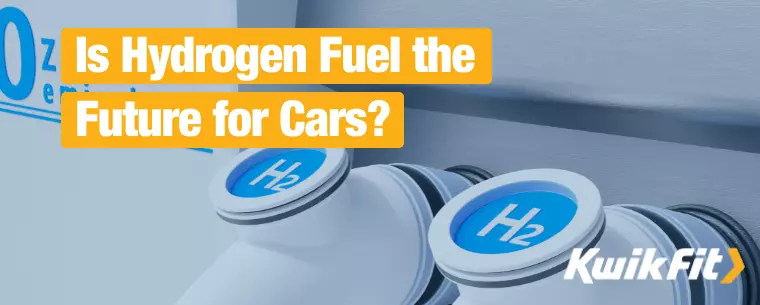Is Hydrogen Fuel the Future for Cars?
Jack Dreyer | Tuesday 17th January 2023 10:45am

The automotive world is waking up to a century of pollution – and governments are growingly putting pressure on manufacturers to adapt quickly. After all, climate change doesn’t appear to be slowing down! The most conspicuous change in the UK has been the explosive growth of the EV market – what used to be an inner-city oddity is now exceedingly common on British roads – but EVs have their problems. Recharge times can be difficult to work with, and they’re still quite pricey!
Now, these are largely technical problems that are likely to get worked out with wider adoption, but you may have heard whisperings of hydrogen fuel cell cars. They offer a promising alternative to battery EVs but have a lot of hurdles to overcome.
Let’s look at whether they might be a viable future for cars.
What are hydrogen fuel cells?
Since the Hindenburg Disaster, hydrogen seems to have had a pretty bad reputation – but it’s come a long way in the last 100-or-so years. And while “hydrogen fuel cell” might sound like something you’d hear in a science fiction film, it’s something that’s been actually used since the 1960s – albeit by NASA to power space shuttles & satellites.
But what are hydrogen fuel cells?
Hydrogen fuel cells act like batteries of sorts; they work through mixing pure hydrogen with oxygen to produce electricity and heat, which can then be used to power the vehicle.
A huge benefit here is that the only exhaust emission is pure water – not necessarily water that we’d recommend drinking from the exhaust itself but water nonetheless. Compared to the vast majority of vehicles on the roads today, that makes for much cleaner air and much less roadside pollution.
So what’s the problem with hydrogen?
So this all seems perfect: refuel as quickly as you do with petrol or diesel vehicles and drive as far as you can with no emissions – where’s the catch?
The catch is primarily a technological one.
Despite being part of the most abundant resource (H2O) on our planet – and itself being the most abundant element in the universe – hydrogen in its pure form is very rare. Usually, it needs to be extracted from water in one of a few ways that we’ll not go into here – but these processes are very energy intensive.
Hydrogen fuel, then, is considered more of a carrier of energy than an energy source itself because it simply represents a conversion of energy. And, at present this energy is primarily sourced from fossil fuels.
If, however, this energy can be obtained from clean, renewable sources (such as solar, wind, or tidal power), then you have an almost entirely emission-free supply chain with an abundant fuel source.

Now, there are emissions in the setup of these systems: the turbines, solar panels, batteries, and so on need to have current energy methods used to create and transport them. But once you have the first batch of clean generators, the emissions are entirely offset by it being able to sustain itself in a zero-emissions, environmentally friendly way.
The huge initial energy requirement means that it hasn’t yet been economically viable to set up hydrogen fuel infrastructure for passenger vehicles.
So how viable is a future of hydrogen cars?
already been more than 15,000 hydrogen cars sold and there’s been significant investment in infrastructure to service them. But this could also just be over-excitement at the prospect of a hydrogen future.
A full transition to hydrogen cars requires a significant ramp up in the technology and scale to extract hydrogen, coupled with a dramatic shift in investment for infrastructure. So it seems likely that they won’t win out when it comes to cars. For larger, industrial applications, however – such as manufacturing and long-distance freight – there’s every possibility that a change to hydrogen fuel is possible within the next few decades.
Considering that the largest emitters worldwide tend to be manufacturing (especially energy-intensive manufacturing like steel or cement) and freight, a shift to zero emissions is very welcome!
When it comes to cars, however, full battery EVs seem poised to take the lead: they’re able to tap into an already-existing electrical grid infrastructure and have the advantage of already-viable technology.
It might be a while yet before we get our flying cars.
Need to get your car flying?
In the real world, we make sure cars work as well as they should for as long as possible – for anything from oil changes, to tyre repairs, to comprehensive Servicing & MOTs, trust the experts at your local Kwik Fit centre.
Any facts, figures and prices shown in our blog articles are correct at time of publication.
Featured Articles
Is it Illegal to Drive With One Headlight?
Saturday 19th July 2025
Wondering if it’s illegal to drive with one headlight? Learn about the safety risks and penalties of illegal blown bulbs and why you should fix them promptly.
Air Con in EVs & Hybrids: Experts Answer Your Questions
Monday 30th June 2025
Does air con drain EV batteries? Can you use the air con while charging an electric car? Find out the answers to these questions & more from Kwik Fit’s experts.
Why Is Your Car Making a Noise? Fixes & Tips
Friday 13th June 2025
When your car starts making unexpected noises, it can certainly be quite disconcerting; it may be nothing to worry about, but here’s what you need to know.









